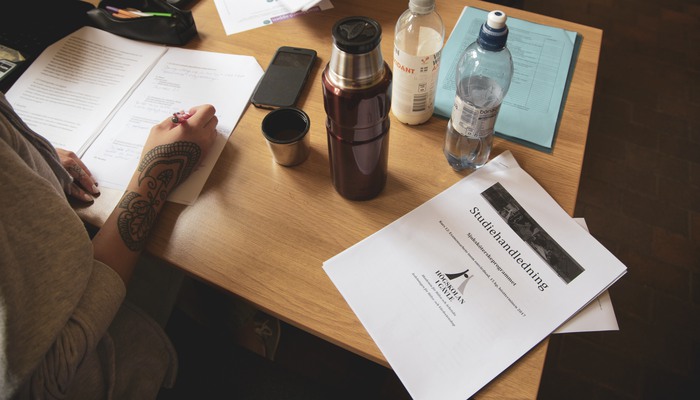Keep your routines
Keep your routines as far as possible by getting up on the usual time. Then get ready and have breakfast. If you usually ride your bicycle or walk to school, it’s a good idea to go for a ride with your bike or take a walk before you start studying.
Organise a workplace
Organise a workplace at your desk or at the kitchen table, where you can have everything you might need nearby, for example books, pencils, study guides and a calendar. If you identify a specific space that you use only for your studies, it’s usually easier to get started.
- Allow your bed to remain a place for rest; don’t turn it into a workplace.
- Try to vary your working position, for instance by standing up for periods of time.
Plan your time
When you organize your time, you provide yourself with an overview of your day, your week and the course. It will become clearer to you what you have to do and when you have to do it, and such an overview usually makes it easier to get started. Yet another benefit of scheduling your work is that you don’t have to remember everything. Once you have it written down, you don’t have to think about it. It is important that you find a way that works for you, but if your plan doesn’t work, don’t give up. Just make a new schedule for yourself.
- Your schedule should be reasonable so that you can stick to.
- Set a time when you finish studying for the day so that you can relax properly.
- Schedule time when you can recover, preferably two days a week.
- Schedule time when you can make a new schedule.
- Use some kind of calendar (a physical or a digital one) or use our weekly schedules below.
Take regular breaks
When you’re studying, taking breaks is important both to stay healthy and to stay concentrated. It’s easy to slip into a sedentary lifestyle when you’re studying at home. For this reason, it’s a good idea to set a timer every 25-45 minutes and to take a short break when the alarm goes off.
- You can do a few squats or run up and down the staircase a few times during your break.
- Schedule a longer lunch break. Taking a walk is a good idea.
Remove distractions
It’s easier to stay focused on your studies if you remove distractions. Start by identifying what distracts you. Here are a few general tips that usually help most students.
- Turn off the sound on your mobile phone and put it in another room when you’re not using it. There are settings on your phone that can limit your screen time in various ways.
- Don’t study in front of the TV.
- Close tabs in your browser that give you direct access to social media and other distractions.
- Don’t sit so that you can see dirty dishes and washing.
Make sure that you stay in contact with your coursemates. It’s a good idea to set up study groups to share thoughts, ideas and study tips. Turn on your webcams and have a coffee together online.
Stay physically active
To be physically active has many advantages. All forms of exercise affect your health in a positive way. You will feel more alert, get stronger and your memory can improve. Exercise both reduces negative stress and has a preventive effect on stress symptoms. Moreover, you will sleep more soundly. If you include physical activities in your everyday life, you will feel better.
- Include physical activities in your everyday life and avoid staying sedentary for long periods of time
- Exercise 2-3 times a week. Brisk walks are a good start.
- Exercise at home. If you Google exercising at home, you will find many tips and workouts.
Fill yourself up with good energy
If you fill yourself up with good energy you will give yourself the strength to study all day. Have breakfast, lunch, dinner and, preferably, some snacks.
There are numerous smart apps and digital tools available that you can use when studying, but don’t let technology take up too much of your time.
- The Pomodoro Technique – the 25-minutes method. Study for 25 minutes, take a break for 5 minutes.
- Time Timer – keeps track of time.
- My Noise – study to sounds you like.
- Forest – stay concentrated while the trees grow.
- Apps to manage your screen time – provide daily overviews of your digital habits.






